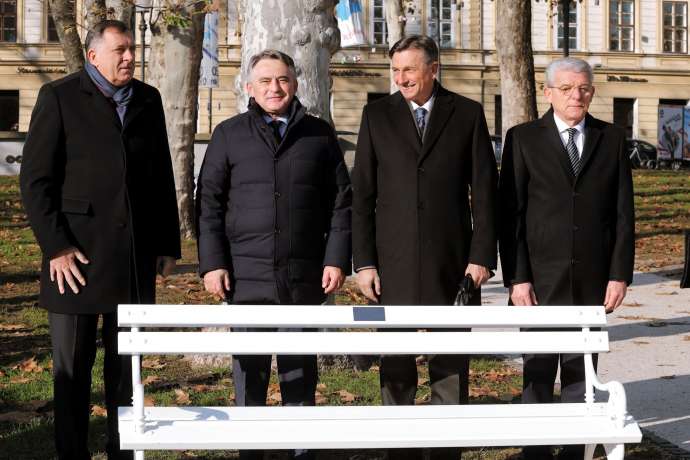STA, 3 December 2019 - The three-member presidency of Bosnia-Herzegovina will pay an official visit to Slovenia on Wednesday and Thursday for talks with their host President Borut Pahor and the country's other top officials.
Chairman Željko Komšić and presidency members Šefik Džaferović and Milorad Dodik are visiting after being elected just over a year ago. The previous presidency visited Slovenia in March 2015.
Pahor's office sees the visit as a continuation of regular bilateral meetings at the highest political level, and an opportunity to reaffirm the traditional friendship between the two countries.
Pahor will receive the presidency with a guard of honour, after which the trio will lay a wreath at the Memorial to Victims of All Wars and open a Bench of Friendship with Pahor in Congress Square.
Po uradnem sprejemu z vojaškimi častmi so predsedujoči ter člana Predsedstva Bosne in Hercegovine položili venec k Spomeniku vsem žrtvam vojn in z vojnami povezanim žrtvam. pic.twitter.com/hFOq5gItxl
— Borut Pahor (@BorutPahor) December 4, 2019
Ob uradnem obisku Predsedstva Bosne in Hercegovine v Sloveniji so predsednik Republike Slovenije in predsedujoči ter člana Predsedstva Bosne in Hercegovine odkrili Klopco prijateljstva na Kongresnem trgu. pic.twitter.com/qB5mfoCvMm
— Borut Pahor (@BorutPahor) December 4, 2019
After talks at the Presidential Palace, the presidency will also meet National Assembly Speaker Dejan Židan and then Foreign Minister Miro Cerar.
On Wednesday, the presidency will also visit an exhibition that looks backs at the 20 years of demining efforts by the Slovenian-run ITF fund in Bosnia and Herzegovina.
A meeting with Prime Minister Marjan Šarec is scheduled for Thursday when the presidency and Pahor are also due to take part in an academic debate on constitutional issues in Bosnia-Herzegovina.
The visit is expected to focus on a variety of topics, including ways to develop bilateral relations and economic cooperation, regional and multilateral cooperation and the implementation of the 2001 Yugoslavia succession treaty.
Bosnia-Herzegovina's reform process and its aspirations to join the EU are also expected to rank prominently, along with topical political and economic situation in the country.
Migration will be another major topic, in particular considering that between 6,000 and 8,000 migrants are estimated to be stranded in Bosnia-Herzegovina, most of them in the north-west of the country.
Due to a lack of accommodation facilities almost half of the migrants are roughing it out in the open or in abandoned buildings, which has been causing discontent among the migrants and the local population.
About 3,300 migrants are accommodated in five EU-funded temporary reception centres. The centre in Bihać is overcrowded and so is the nearby Vučjak refugee camp where migrants live in appalling conditions.
The European Parliament and the former European Commissioner for Migration and Home Affairs Dimitris Avramopoulos have called on the Bosnian authorities to move the migrants into appropriate reception centres to prevent a humanitarian disaster in the winter.
Bosnia-Herzegovina is also grappling with economic difficulties and high unemployment. The country has been trying to make headway in the process to join the EU and NATO.
The country submitted an application for EU membership three years ago, but the European Commission has merely issued an opinion on its application without giving it candidate status or making any recommendations to member states on the future course of action.
The biggest obstacle to membership of NATO, apart from meeting the alliance's requirements, is the opposition by the Serb entity and the Serbian member of the presidency Dodik, the former long-serving president of Republika Srpska.
Slovenia has been vocally supporting Bosnia-Herzegovina's aspirations to join the EU and NATO and the countries have good political and economic relations.
Bilateral merchandise trade rose to a record EUR 1.34 billion last year, amounting to nearly EUR 881 million in the first eight months of this year, Slovenia's exports accounting for EUR 521 million.
Slovenia is also a major investor in Bosnia-Herzegovina with more than a hundred companies there in majority Slovenian ownership.
Along with other successors to the former Yugoslavia, the countries are also engaged in the implementation of the succession agreement. Slovenia would like talks to start on division of the former federation's guarantees for the savings deposits.
Pahor met the new presidency in the Bosnian capital on 17 April when he attended the Sarajevo Business Forum at their invitation.
Miro Cerar made an official visit to Bosnia-Herzegovina in April 2017 as the first Slovenian prime minister since 2010.
The last Bosnian official to visit Slovenia was Foreign Minister Igor Crnadak in April 2018, while senior officials from the two countries meet regularly on the sidelines of multilateral meetings.






